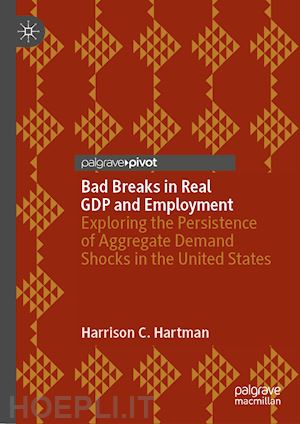
Questo prodotto usufruisce delle SPEDIZIONI GRATIS
selezionando l'opzione Corriere Veloce in fase di ordine.
Pagabile anche con Carta della cultura giovani e del merito, 18App Bonus Cultura e Carta del Docente
Why do policymakers allow economies to settle into a “new normal” after a bad break in the economy rather than try to return the economy to its previous trend? In this book, economist Harrison C. Hartman discusses some of the variables that impact a nation’s ability to recover from negative aggregate demand shocks.
Spanning total real GDP, per capita real GDP, and nonfarm payroll employment in the USA, the book emphasizes the role of aggregate demand shocks in causing the US economy to fail to return to trend. The resulting book challenges modern mainstream macroeconomic theories and highlights the complexities of post-recession recovery. The chapters provide econometric evidence both for and against the impact of aggregate demand on real GDP and employment levels in the long run.
Hartman studies modern macroeconomic theories related to economic resilience and demand using (a) the velocity of money and the equation of exchange and (b) econometric analysis to dissect modern macroeconomic theories related to economic resilience and demand. The book provides methods to estimate and evaluate trends, and after simple methods for estimating trend and discussing associated results, the book turns attention to model selection, hypothesis testing and further results. This book also offers some possible areas for future work.
A thought-provoking exploration of economic recovery or lack thereof, the book covers aggregate demand, employment, real GDP, and economic theories (classical, Keynesian, monetarist, neoclassical, new-Keynesian, and post-Keynesian perspectives). Bad Breaks in Real GDP and Employment is a timely and essential guide for economists navigating the complexities of past, present, and future macroeconomic landscapes. It explains the functionality of aggregate demand in the context of economic recession, offering insight into why some AD shocks feel permanent.
This book provides econometric evidence supporting Keynesian and post-Keynesian perspectives on the potential importance of aggregate demand in determining real GDP and employment levels in the long run, particularly in cases when real GDP and employment fail to recover fully after recessions.
This book is one of few contemporary works (a) explicitly noting the economic importance of money velocity and (b) focusing on econometric analysis that at least at times supports post-Keynesian perspectives.
CHAPTER 1: INTRODUCTION TO MODERN MAINSTREAM MACROECONOMIC THOUGHT VERSUS KEYNES’ VIEWS ON RECOVERIES FROM RECESSIONS.- CHAPTER 2: LITERATURE REVIEW OF MAJOR SCHOOLS OF MACROECONOMIC THOUGHT AND EMPIRICAL WORK.- CHAPTER 3: RESULTS FROM ESTIMATING AND PROJECTING TRENDS FOR RECENT RECESSIONS.- CHAPTER 4: ECONOMETRIC ISSUES TO CONSIDER AND MODEL SELECTION FOR SOME HYPOTHESIS TESTS.- CHAPTER 5: HYPOTHESIS TESTING WITH REAL GDP: SOMEWHAT MIXED RESULTS.- CHAPTER 6: DERIVED DEMAND FOR LABOR AND BREAKS IN TREND: DOES HYSTERESIS IN EMPLOYMENT IMPLY HYSTERESIS IN THE GROWTH PATH OF REAL OUTPUT?.- CHAPTER 7: SIMILAR RESULTS FROM AN EXTENDED SAMPLE PERIOD AND CONCLUDING REMARKS TO GUIDE FUTURE WORK.
Harrison C. Hartman is an economist who has taught at Emory University, Georgia State University, University of Georgia, Kennesaw State University, Ursinus College, and Penn State University. He is the author of It's Velocity Stupid! (2015).











Il sito utilizza cookie ed altri strumenti di tracciamento che raccolgono informazioni dal dispositivo dell’utente. Oltre ai cookie tecnici ed analitici aggregati, strettamente necessari per il funzionamento di questo sito web, previo consenso dell’utente possono essere installati cookie di profilazione e marketing e cookie dei social media. Cliccando su “Accetto tutti i cookie” saranno attivate tutte le categorie di cookie. Per accettare solo deterninate categorie di cookie, cliccare invece su “Impostazioni cookie”. Chiudendo il banner o continuando a navigare saranno installati solo cookie tecnici. Per maggiori dettagli, consultare la Cookie Policy.